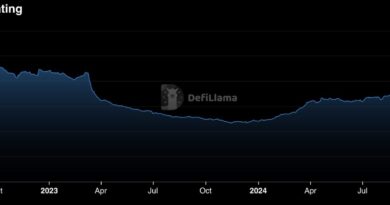Binance CEO Says He Fully Expects DeFi to Cannibalize His Crypto Exchange

Binance CEO Changpeng “CZ” Zhao acknowledges the contradictions inherent in trying to tap into the fast-growing business of decentralized finance, or DeFi, while trying to defend his company’s reign as the world’s largest cryptocurrency exchange.
The company’s new foray into DeFi, Binance Smart Chain, attempts to replicate some of the features of the Ethereum blockchain that have proven fertile for developers building decentralized, blockchain-based trading and lending applications that theoretically could one day challenge traditional lenders and Wall Street trading firms. But DeFi could also threaten big cryptocurrency exchanges like his own.
Like rival cryptocurrency exchanges OKEx, Huobi and Coinbase, Binance is trying to hold on to its central role in digital-asset markets as upstart DeFi projects like Uniswap, Curve, Balancer and SushiSwap attract a bigger share of industry trading volumes. Zhao says he’s open to the idea that Binance may have to adapt its business model to stay relevant, especially with total collateral locked into DeFi protocols surging 16-fold this year to $11 billion.
“Our mission is not to build a CeFi exchange,” Zhao said in an interview with CoinDesk, using a shorthand term for centralized finance. “Right now it is one of our larger businesses that support our growth. But over the long term, we want to push decentralization.”
In designing Binance Smart Chain, the company had to sacrifice elements of decentralization to compete against Ethereum and protect the company’s brand. Binance Smart Chain is controlled by 21 node operators, which are elected by Binance Coin (BNB) holders. But because the company is one of the largest holders of the BNB tokens, it retains significant control over the project’s direction.
“There is a tradeoff between more decentralization versus speed, so we thought that 21 nodes run by the community is probably enough,” Zhao said in the interview.
Binance Smart Chain’s goal is not to be “the Ethereum Killer,” Zhao says, but to provide an alternative to users and developers frustrated with Ethereum’s soaring transactions fees.
“There are people who are really more into more decentralization,” Zhao said. “They will probably stick with Ethereum.”
An anything-goes culture thrives in DeFi, with ridiculously named projects from Yam to SushiSwap exploding in popularity seemingly overnight, only to quickly flame out. But Binance can’t afford to release the reins entirely on its DeFi project; there are reputational concerns, a brand to protect.
BakerySwap Falls Flat
After Binance Smart Chain launched earlier this month, anonymous developers used it to create BakerySwap, a type of decentralized trading network known as an automated market maker, similar to Uniswap.
Zhao tweeted that he was “Introducing BakerySwap” and that his message was “not endorsement and SUPER HIGH RISK” but that the project was “causing quite a stir on the street.”
Within an hour of BakerySwap’s launch, the protocol collapsed. And Zhao deleted his earlier tweet.
“There are probably more projects that failed on Ethereum, but nobody complains to Vitalik,” Zhao said, referring to Ethereum founder Vitalik Buterin. “So I think it just takes time for people to realize that, ‘Look, the projects on Binance Smart Chain are not run by Binance.’”
Zhao sees DeFi becoming more popular in the Asian markets of China, Thailand and Singapore.
“We just experiment with a bunch of different things, that something will stick,” he said. “And when something sticks, we want to push ourselves and also push our innovation in the same space.”
Zhao has said that if decentralization wins out as the dominant business model for trading venues in digital-asset markets, Binance could still profit from its holdings of the BNB tokens. In the interview, he said the company could also profit by shifting its focus to building decentralized applications.
“So in my mind, I’m never worried about the business model,” CZ said. “I’m always much more worried about if we have users using the product. There’s always multiple options for business models, so the key is to build something that’s useful.”


